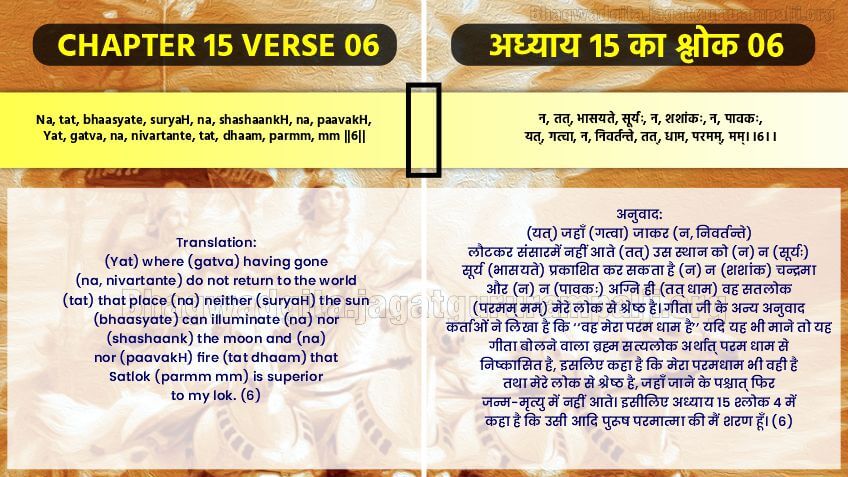
Na, tat, bhaasyate, suryaH, na, shashaankH, na, paavakH,
Yat, gatva, na, nivartante, tat, dhaam, parmm, mm ||6||
Translation: (Yat) where (gatva) having gone (na, nivartante) do not return to the world (tat) that place (na) neither (suryaH) the sun (bhaasyate) can illuminate (na) nor (shashaank) the moon and (na) nor (paavakH) fire (tat dhaam) that Satlok (parmm mm) is superior to my lok. (6)
Translation
Having gone where, do not return to the world; neither the sun can illuminate that place, nor the moon, nor fire. That Satlok is superior to my lok. The other translators of Gita ji have written that “That is my supreme abode”. Even if we consider this, then this speaker of Gita, Brahm, has been expelled from Satyalok i.e. supreme abode. Therefore, has said that even my supreme abode is that only and it is superior to my lok; having gone where one does not return to birth-death. Therefore, in Adhyay 15 Shlok 4 has said that I am in the refuge of that same Primeval Supreme God.
न, तत्, भासयते, सूर्यः, न, शशांकः, न, पावकः,
यत्, गत्वा, न, निवर्तन्ते, तत्, धाम, परमम्, मम्।।6।।
अनुवाद: (यत्) जहाँ (गत्वा) जाकर (न, निवर्तन्ते) लौटकर संसारमें नहीं आते (तत्) उस स्थान को (न) न (सूर्यः) सूर्य (भासयते) प्रकाशित कर सकता है (न) न (शशांक) चन्द्रमा और (न) न (पावकः) अग्नि ही (तत् धाम) वह सतलोक (परमम् मम्) मेरे लोक से श्रेष्ठ है। गीता जी के अन्य अनुवाद कर्ताओं ने लिखा है कि ‘‘वह मेरा परम धाम है’’ यदि यह भी माने तो यह गीता बोलने वाला ब्रह्म सत्यलोक अर्थात् परम धाम से निष्कासित है, इसलिए कहा है कि मेरा परमधाम भी वही है तथा मेरे लोक से श्रेष्ठ है, जहाँ जाने के पश्चात् फिर जन्म-मृत्यु में नहीं आते। इसीलिए अध्याय 15 श्लोक 4 में कहा है कि उसी आदि पुरूष परमात्मा की मैं शरण हूँ। (6)
